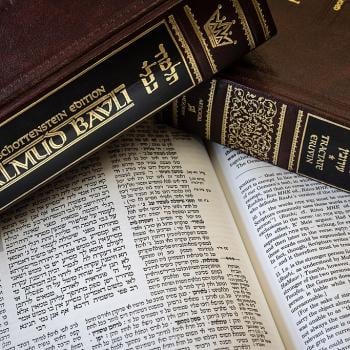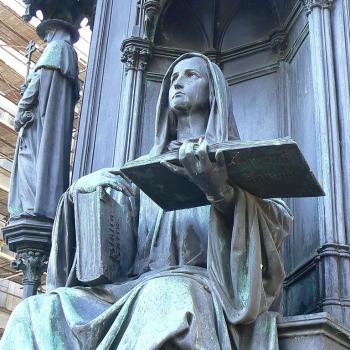
This is the last part of a series reflecting on Mary as Panagia, the All Holy One. Click here for Part I , click here for Part II, click here for Part III, click here for Part IV, and click here for Part V.
Having discussed how Mary can recognize God as her savior and yet remain sinless, it is time for us to address the second question raised above, which was, how are we to interpret Paul when he said that all have sinned? If what Paul said is correct, and we must take it as such being Holy Scripture, how can we believe that Mary lived an entirely pure and blameless life? Does not Paul contradict this belief?
The solution begins to reveal itself as we put Paul’s words in context. This allows us to see what Paul intended, and makes sure we do not take a few words out of context for the sake of pretext, for it is always easy to take a few words said by anyone, and twist their intended meaning when taken in isolation. And so we read:
But now the righteousness of God has been manifested apart from law, although the law and the prophets bear witness to it, the righteousness of God through faith in Jesus Christ for all who believe. For there is no distinction; since all have sinned and fall short of the glory of God, they are justified by his grace as a gift, through the redemption which is in Christ Jesus, whom God put forward as an expiation by his blood, to be received by faith. This was to show God’s righteousness, because in his divine forbearance he had passed over former sins; it was to prove at the present time that he himself is righteous and that he justifies him who has faith in Jesus. Then what becomes of our boasting? It is excluded. On what principle? On the principle of works? No, but on the principle of faith. (Rom. 3:21-27 RSV).
Paul wrote to remind his audience that their justification, their holiness, comes from the grace which they receive from the sanctifying work of Jesus Christ. Therefore, no one should boast of their holiness as if it is something they accomplished all by themselves, for no one possesses such holiness in themselves. Everyone apart from grace finds themselves away from the righteousness of God. It is only when they are totally penetrated by God’s grace do they find themselves to be righteous. Thus, Paul was saying that those who had the Law of Moses and those who did not both found themselves turned away from God. All peoples, all nations, have found themselves far away from the glory of God. The Law of Moses, which was good, did not stop the people from Israel from sinning and so, like the Gentiles, they fell short of the glory of God. Israel, despite what God did for them through Moses and the Prophets, had nothing to boast about:
What then? Are we Jews any better off? No, not at all; for I have already charged that all men, both Jews and Greeks, are under the power of sin, as it is written: “None is righteous, no, not one; no one understands, no one seeks for God. All have turned aside, together they have gone wrong; no one does good, not even one” (Rom. 3:9-12 RSV).
Paul’s message, therefore, was in relation to general populations who thought, for one reason or another, that their nation or people are greater than any other. This, to be sure, was especially the case with those Jews who had become Christian. The messiah, after all, came from the Jews. Paul was reminding them that those believers who came from the Gentile populations were their equals. The Jews should not boast as if they were greater than their brothers and sisters in Christ. Thus, St. John Chrysostom, in his preaching on this chapter of the book of Romans, saw how it was about the relationship between the people of Israel and the Gentiles. He understood Paul as trying to help the people of Israel adjust to their new place in Christ. No nation was better off than any other, and so all peoples should come together in loving harmony through faith in Christ. Chrysostom therefore began his homily saying:
He had accused the Gentiles, he had accused the Jews; it came next in order to mention the righteousness which is by faith. For if the law of nature availed not, and the written Law was of no advantage, but both weighed down those that used them not aright, and made it plain that they were worthy of greater punishment, then after this the salvation which is by grace was necessary.[1]
Paul had to remind everyone of their common heritage, that all nations, even those who thought they could claim some exclusive relationship with God, failed short of the glory of God. Israel had something great with the Law of Moses, which could and did grant an element of grace to the people of Israel, but it also judged them and showed their faults to be worse than those apart from the Law because they failed to live up to the expectations of the Law of Moses. That which made them great also made them great in their failure. And so, Chrysostom continued:
Here again the Jew is alarmed by his not having anything better than the rest, and being numbered with the whole world. Now that he may not feel this, he again lowers him with fear by adding, “For there is no difference, for all have sinned.” For tell me not that it is such and such a Greek, such and such a Scythian, such and such a Thracian, for all are in the same plight. For even if you have received the Law, one thing alone is there which you have learned from the Law— to know sin, not to flee from it. Next, that they may say, “even if we have sinned, still it is not in the same way that they did,” he added, “and have come short of the glory of God.” So that even if you have not done the same sins as others, still you are alike bereft of the glory, since you belong to those who have offended, and he that has offended belongs not to such as are glorified, but to such as are put to shame. Yet, be not afraid: for the reason of my saying this was not that I might thrust you into despair, but that I might show the love of the Lord (Δεσπότου) toward man: and so he goes on…[2]
Thus, while each nation might have something special to offer to the world in and through the way God worked with them, none should find themselves better than anyone else. All peoples, all nations are equal in front of God. Everyone is equal, everyone needs God’s grace, and in and through Jesus, that grace is made available to all. Some take it and through loving fidelity to Jesus find themselves infused with grace and made righteous, while others, so long as they resist grace, continue to find themselves turned away from God. The discussion, therefore, was about the need for grace and how that need unites everyone together as they find themselves to be equal to each other in the Body of Christ. What Paul was saying here, therefore, was another way to say what he said to the Galatians: “There is neither Jew nor Greek, there is neither slave nor free, there is neither male nor female; for you are all one in Christ Jesus” (Gal. 3:28 RSV).
As we have seen, Mary would be properly included in this need for grace, because it is in and with grace which she lived a pure life. She would be, and was, the first to acknowledge her humble position as the handmaid of the Lord (Lk. 1:38). The humility which Paul exhorted out of his audience was already realized by Mary. Her greatness was proven by her realization of how she could not be holy if she did not have the continuing presence of God in her life. And in this sense, she realized the fullness of Paul’s intent by such humility – she did not boast, she did not consider herself great, and so, as a result, without the kind of egotistical pride which closes off grace, she totally opened herself to the presence of God in her life and lived a perfectly holy life thanks to his grace.
From this, it should be clear, the claim which suggests Paul’s words in the Book of Romans indicates Mary herself had to be a sinner can only come out of a poor understanding and use of Paul’s words. Paul’s intention was to remind everyone that apart from grace, apart from the righteousness of God, we find ourselves to be sinners. If we do anything good, it is because of God’s grace and so nothing of which we should boast. Paul’s audience would have recognized and understood the point of Paul’s exhortation, for they would have experienced the contention which was driving the Jews and Gentiles apart, the contention which Paul strove to fix. They would have recognized the meaning of the text was found in the whole of the text, and not a few words taken out of context.
If there is any doubt of this, and some would still want to suggest the most literal interpretation of a few words taken out of context, all we have to do is examine the consequence of such a position. If we believe it is a necessity for all who are human to personally be indicted by sin, to have actually sinned in their lives, then Jesus, thanks to his human nature, would have to be included in that “all” and would have to be seen to be a sinner like the rest of us. That means, if we follow the verse, not for its intended meaning and use, but for the simple literal extreme some make out of it, the conclusion would be the blasphemous position that Jesus was a sinner.[3] Or if some want to deny that, then the only other conclusion, which would also be false, would be to say that Jesus was not truly human and this would be why he would not be a sinner. This secondary reply, of course, contradicts Scripture which makes it clear that Jesus was a man, indeed, that it was because he was man he was able to work for our salvation: “For there is one God, and there is one mediator between God and men, the man Christ Jesus” (1Tim. 2:5 RSV). Jesus truly was man – even as he was God, one person with two natures, and so all that is said about being man is to be said about Jesus; if it is necessary to be seen as unrighteous and a sinner to be human, then Jesus would be a sinner. But this is not the case, indeed, Paul himself made it clear in Romans that Jesus was righteous, and it was his righteousness which was able to be applied to us and make us righteous. This means the “all” was not intended to be taken in the fashion critics of Mary’s purity make it out to be. Jesus shows that there is an exception to that “all,” and Mary, because her flesh is the same flesh as the body of Christ, must also be seen as without sin, as a part of that exception, for it is her humanity which Jesus possesses, and if her humanity would be seen as impure, his would be as well.
Paul, therefore, was talking about the history of the peoples of the earth before the incarnation, and how all find themselves equal in their need for grace. He was not indicating anything about particular people and their unique walks with God; nothing he said indicted Mary herself was a sinner, though we could say she was the exception which proved the rule. She was full of grace because she was entirely open to God; she was righteous because she entirely humbled herself and let God do with her as he will without question. She is the exemplar of what it meant for human righteousness, and the goal of the Christian life. In and through her, we see not the boast of pride which tries to claim glory for itself, but the honest admittance that she does nothing apart from God, that she is holy because of God’s work in and with her. We, too, are called to be holy and can become it, thanks to grace; but if we do so, we must follow the example of Mary, who as the glory of Israel, Daughter Zion, did the will of the Father (cf. Matt. 12:50). She shows it is possible. But this is because she, like her son, saw the glory which she had was not a thing to be grasped, but a thing to be opened up to and follow in loving servitude for others.[4] To reject her and her holiness would be closing off the holiness of God from humanity, which was the farthest thing from the mind of Paul, who saw such holiness was necessary for salvation.
And so we can recognize the great thing God has done in humanity was done, in a special sense, in and through Mary. Humanity was made ready for the incarnation through the grace which was being accumulated in the line of David. Mary came forth, full of grace, the all-holy one, free to be the one to speak for us all, to say yes or no to God for all of us. If she said no, the incarnation would have had to be grounded in a new line of descent, but through her yes, the preparation for the incarnation had found its fulfillment. Through her yes, God became man and now humanity can find itself raised up in God, partaking of the divine nature for eternity. Through her yes, humanity had found its natural apex, and now, through her it can rise above itself and find itself united to God in the God-man, Jesus Christ.
[1] St. John Chrysostom, “Homilies on Romans” in NPNF2(11): 375.
[2] ibid,, 377.
[3] Such a teaching would contradict the book of Hebrews, wherein the author declared Jesus to be without sin (cf. Heb. 4:15).
[4] That is, she followed to the full what Paul wrote in the letter to the Philippians: “Do nothing from selfishness or conceit, but in humility count others better than yourselves. Let each of you look not only to his own interests, but also to the interests of others. Have this mind among yourselves, which was in Christ Jesus, who, though he was in the form of God, did not count equality with God a thing to be grasped, but emptied himself, taking the form of a servant, being born in the likeness of men” (Philip. 2:3-7 RSV). She constantly emptied herself of all pretense to glory and lived a life of loving servitude in humility, giving herself over entirely to God (and through him, to all of us). This exemplified her holiness, that she did not seek to grasp after it but let it flow in and through her – for that alone is where holiness is found – any who shall try to grasp after it shall lose it, but anyone who lets it flow through them will find it elevates them to perfection, the perfection seen in Jesus and in his mother, Mary.
Stay in touch! Like A Little Bit of Nothing on Facebook:
A Little Bit of Nothing












